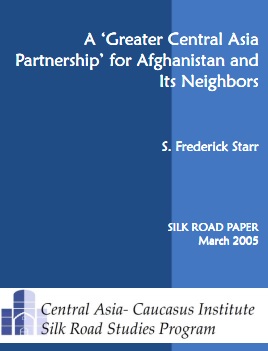By S. Frederick Starr
March 2005
Executive Summary
Afghanistan is approaching a turning point. Security is increasing, institutional renewal is progressing, the economy is growing, and an open political system is taking root at both local and national levels. It is no exaggeration to declare that Afghanistan is emerging as the first major victory in the international war on terrorism. But victory should mark not just an end—in this case to civil chaos – but also a beginning. To now, America has scarcely considered what further vistas victory may open, let alone how it should respond to them. This is the urgent need of the moment.
This paper proposes that progress in Afghanistan has opened a stunning new prospect that was barely perceived, if at all, when Operation Enduring Freedom was launched. This prospect is to assist in the transformation of Afghanistan and the entire region of which it is the heart into a zone of secure sovereignties sharing viable market economies, secular and relatively open systems of governance, respecting citizens’ rights, and maintaining positive relations with the U.S..
The emergence of this zone, referred to herein as “Greater Central Asia,” will roll back the forces that give rise to extremism and enhance continental security. It will bring enormous benefit to all the countries and peoples of the region, and, significantly, also to major powers nearby, notably Russia, China, and India, At the same time, it directly promotes U.S. interests by serving as an attractive model for developing Muslim societies elsewhere. Thus, the emergence of Greater Central Asia will open grand vistas that defy the usual zero-sum thinking.
Many of the greatest threats to Afghanistan today are regional in character:
- Instability exists to the east and southeast, and could arise from countries to the west or north if evolutionary processes are thwarted there or if any single outside power expands its influence and control in the region at the expense of a reasonable balance among them. Any such instability is bound to involve global powers.
- Also, many of the domestic challenges facing Afghanistan, including issues of security, governance, economics, and culture, are regional in character, and not purely national.
If significant foreign and domestic challenges facing the new Afghanistan are regional in scope, so are the solutions. Only a regional approach will enable Afghanistan to take advantage of the many commonalities and complementarities that exist between it and its neighbors.
The major potential engine of positive change for Afghanistan and its immediate and more distance neighbors is the revival of regional and continental transport and trade. The arrangements that make possible such trade exist only in embryonic form today.
To minimize the threats and maximize the potential, the U.S. must adopt a strategy very different from that which guided its forces in 2002, one that is framed in terms of long-term objectives rather than immediate needs. These objectives include:
1. Advance the war against terrorism and terrorist groups, building U.S.-linked security infrastructures (including necessary U.S. basing arrangements) on a national and regional basis, basing these on perceived mutual interests, and in such a way that the U.S. can use its presence there to respond to crisis in proximate regions such as South Asia and the Middle East.
2. Enable Afghanistan and its neighbors to protect themselves against radical Islamist groups, both foreign and domestic.
3. Assure that no single state or movement, external or internal, dominates the region of which Afghanistan is a part, and those resources which are its economic base.
4. Strengthen sovereignties by continuing to develop the Afghan economy and society and by strengthening trade and other ties between Afghanistan and its neighbors in the region.
5. Foster open, participatory, and rights-based political systems that can serve as attractive models for other countries with Muslim populations.
To pursue these objectives the U.S. should:
1. Adopt a “post-post 9:11 strategy that realigns all existing programs in Afghanistan and its neighbors with long-term goals and not just with the urgent but short-term needs that dominated after 9:11.
2. Adopt a systematic region-wide approach to U.S. security and developmental programs in Afghanistan and neighboring states.
3. Establish a permanent “Greater Central Asia Partnership for Cooperation and Development” (hereafter “GCAP”), led by a senior officer of the Department of State, that will coordinate and integrate the U.S.’ bilateral and region-wide programs in diverse fields, including economic and social development, governance, trade, counter-narcotics, anti-corruption, democracy, and transparency, as well as security. The GCAP should be proposed as a U.S. government entity but should be transformed, if the participants so desire, into an independent, multinational organization.
4. Engage Afghanistan and all regional states in GCAP activity as partners and on an a la carte basis.
5. Open GCAP activities to participation by other donor countries, as well to observers from other states with which the U.S. maintains normal relations.



